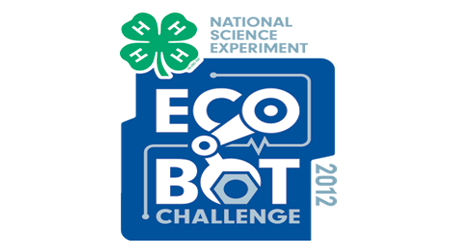 4-H National Headquarters and National 4-H Council are pleased to announce the 2012 National Science Experiment: 4-H Eco-Bot Challenge. This year’s experiment will introduce youth to robotic engineering concepts as they program a self-directed robot to clean up a simulated environmental spill. This exciting annual youth science event brings together youth from all around the nation to complete a single, innovative experiment on 4-H National Youth Science Day (NYSD), which will be held on Wednesday, Oct. 10, 2012.
4-H National Headquarters and National 4-H Council are pleased to announce the 2012 National Science Experiment: 4-H Eco-Bot Challenge. This year’s experiment will introduce youth to robotic engineering concepts as they program a self-directed robot to clean up a simulated environmental spill. This exciting annual youth science event brings together youth from all around the nation to complete a single, innovative experiment on 4-H National Youth Science Day (NYSD), which will be held on Wednesday, Oct. 10, 2012.
Designed by The Ohio State University and Ohio State Extension, the 2012 National Science Experiment will demonstrate that by utilizing engineering principles, youth can have a positive impact on communities and ecosystems. 4-H’ers will enhance their engineering skills by assembling their own Eco-Bots and control surfaces to manage an environmental clean-up. Youth will then test the interaction between the Eco-Bot’s design features and various surface control configurations to determine the most effective clean-up solution for the simulated spill.
“We created this year’s experiment to help young people understand the important link between engineering, the environment and working together to find solutions,” said Dr. Bob Horton, a STEM Education Professor at The Ohio State University’s 4-H Youth Development Center, who developed the 2012 National Science Experiment. “Ultimately, we hope that this experiment will inspire young people to stay engaged in science and engineering throughout their secondary education, through college and into a rewarding career.”
“Now entering its fifth year, 4-H National Youth Science Day will again bring young people face-to-face with the challenges of today’s global economy,” said Donald T. Floyd, Jr., National 4-H Council president and CEO. “America faces a future of intense global competition with a startling shortage of scientists. However, with high-quality positive youth development programs like 4-H NYSD, youth are introduced to highly relevant concepts and solutions that will ensure their contributions to their communities today, and their success as global leaders tomorrow.”
“4-H National Youth Science Day is a great opportunity for young people across the country to have a hands-on experience about a current science topic. Introducing science and technology innovation to youth is why 4-H started more than 100 years ago,” said Lisa Lauxman, Director of 4-H National Headquarters. “In the 4-H Ecobot Challenge, youth will explore science and engineering by making a simple robot to operate in an environmental cleanup simulation. This may be the spark that encourages them to learn more about robotics and discuss the implications for the communities where they live.”
Every year, 4-H National Headquarters and National 4-H Council invite Cooperative Extension System faculty and staff from the nation’s 111 land-grant colleges and universities to submit proposals outlining and detailing an innovative experiment for youth to conduct during 4-H NYSD. Once received, a committee made up of staff from 4-H National Headquarters and National 4-H Council along with a cohort of experts in the field of education, engineering and science, review all of the proposals and narrow and choose that year’s National Science Experiment.
About NYSD
For more than 100 years, 4-H has been at the forefront of teaching youth about science, engineering and technology. Created to combat a shortage of American young people pursuing science college majors and careers, 4-H National Youth Science Day seeks to spark an early youth interest and leadership in science.
Currently, more than five million young people across the nation participate in 4‑H science, engineering and technology programming in topics as varied as robotics, rocketry, wind power, GPS mapping, agricultural science, film making, water quality and biofuels. And, through the One Million New Scientists, One Million New Ideas campaign, 4‑H has undertaken a bold goal of engaging one million additional young people in science, engineering and technology programming by 2013. For more information on 4-H NYSD, visit www.4-H.org/NYSD.
This year’s 4-H National Youth Science Day is jointly sponsored Lockheed Martin, Toyota, Donaldson Filtration Systems, and John Deere.
About OSU Extension
Ohio State University’s Extension Service brings the knowledge of the university directly to you the citizens of Ohio. It fulfills the land-grant mission of the university by interpreting knowledge and research developed by on-campus faculty, along with researchers at the Ohio Agricultural Research and Development Center, and other land-grant universities – so Ohioans can use the scientifically based information to better their lives, businesses and communities.
The Extension system is the world’s largest non-formal educational system. Extension’s hallmark is programming delivered by professionals to address the needs of the local community while also addressing state, national, and global issues. Our practical educational programs combine the needs of local citizens and communities with new research and technical information.
No matter which county you visit, you can find people who are helped by the four major OSU Extension program areas: family and consumer sciences, 4-H youth development, community development, and agriculture and natural resources. These program areas – and many other special topics – are continuously being evaluated and updated to meet the changing needs and issues facing each community.
Extension provides practical advice, sensible solutions, and realistic down-to-earth answers for all Ohioans.
About 4-H
4-H is a community of six million young people across America learning leadership, citizenship, and life skills. National 4-H Council is the private sector, non-profit partner of 4-H National Headquarters located at the National Institute of Food and Agriculture (NIFA) within USDA. 4-H programs are implemented by the 111 land-grant universities and the Cooperative Extension System through their 3,100 local Extension offices across the country. Learn more about 4-H at www.4-H.org or follow us on Facebook at www.facebook.com/4-H.

